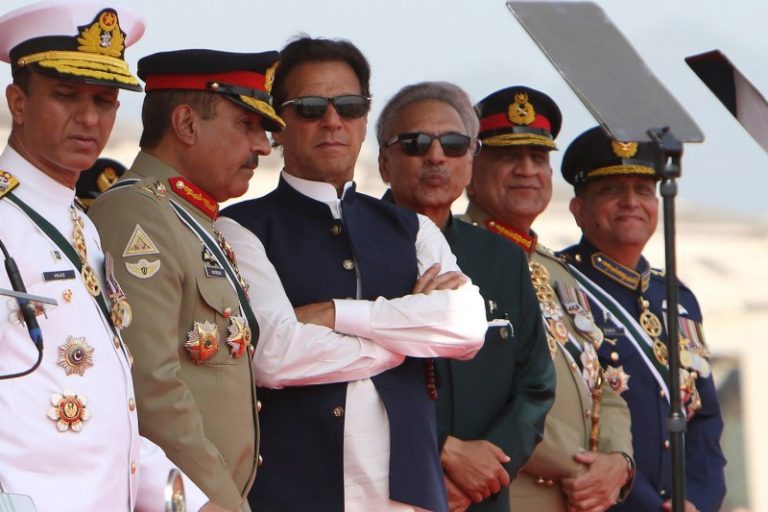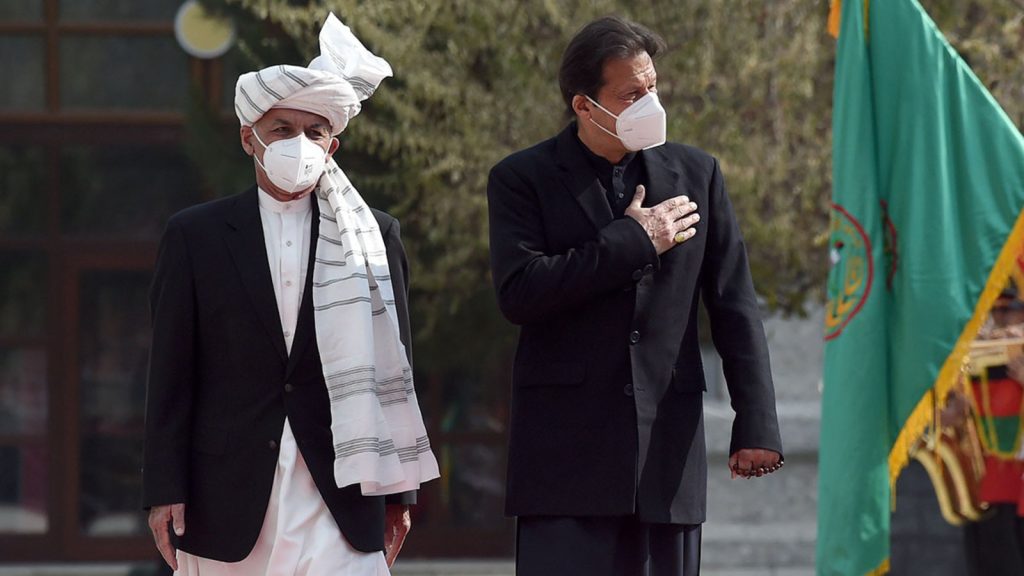Pakistan Prime Minister Imran Khan’s future looked increasingly in doubt after a key coalition partner switched allegiance ahead of a parliamentary no-confidence vote that could be held as early as this weekend.
Debate on the no-confidence motion is due to start on Thursday, leaving Mr Khan scrambling to keep his own Pakistan Tehreek-e-Insaf (PTI) members on side — as well as a slew of minority parties.
Pressure is growing on Pakistan’s embattled Prime Minister Imran Khan to step down after a crucial ally switched to the opposition ahead of a no-confidence vote in parliament.
The Muttahida Qaumi Movement Pakistan (MQM-P) party, a major political force in Sindh province, announced it is leaving the ruling Pakistan Tehreek-e-Insaf (PTI)-led coalition government. The move came following drawn-out negotiations between MQM-P and opposition leaders. With MQM-P’s exit, the ruling alliance is now left with 164 votes. Senior MQM-P leader Faisal Subzwari tweeted that his party had finalised an agreement with the opposition, led by the Pakistan People Party (PPP) and Pakistan Muslim League (PML-N).
Khan needs 172 votes in the 342-seat National Assembly to defeat the no-confidence motion moved by the opposition, whose numbers have swelled to 177 with nearly two dozen PTI legislators deserting Khan.
If Imran Khan loses the vote, a new government could be headed by PML-N’s Shehbaz Sharif, the brother of former Prime Minister Nawaz Sharif, who has not returned since being released from jail in 2021 to get medical treatment abroad. Also given a senior role will likely be the PPP’s Bilawal Bhutto Zardari, son of assassinated former Prime Minister Benazir Bhutto and ex-President Asif Zardari.
Under the Pakistan Constitution, a Prime Minister is elected by a majority of the lower house National Assembly, which has 342 members. A candidate needs a majority of legislators, 172, to vote for him to become Prime Minister. That is the same number of votes against him in a no-confidence vote needed to oust him and dissolve his cabinet. So Mr Khan could survive a no-confidence vote even if he got fewer votes than the opposition but only if the latter did not get the 172 votes that make up a majority in the 342-seat house.
Khan is also believed to have lost the support of the military over the choice of a new spy chief, a charge both Khan and the military deny.
The military’s backing had been a stabilising factor for Khan’s administration. However, opposition leaders claim the military establishment is “neutral” in the current political crisis.
No Prime Minister in Pakistan’s history has seen out a full term, and Mr Khan is facing the biggest challenge to his rule since being elected in 2018, with opponents accusing him of economic mismanagement and foreign-policy bungling.
If Imran Khan loses the vote, parliament can continue to function until its five-year tenure ends in August 2023, after which a general election is due within 60 days. There will be a vote in the National Assembly to elect a new Prime Minister to serve until then. Candidates can be put forward by any party with legislators in the assembly. The new Prime Minister can, however, call a general election immediately, without waiting until 2023. Assembly can be dissolved, and a general election held if no candidate can secure a majority of votes to become the Prime Minister.
However, Imran Khan’s could call an early election — the next one must be held before October 2023. The best option in this situation would have been fresh elections to enable the new government to handle economic, political and external problems faced by the country.
The political turmoil started in Pakistan earlier this month after the opposition announced it would bring a no-confidence motion against Khan’s government. An alliance of opposition parties is accusing Khan’s government of corruption and blaming him for mismanaging the country amid a growing economic crisis.
As Khan faced the biggest challenge of his political career, he blamed a foreign-funded conspiracy for trying to topple him. In an address to his supporters at a rally in Islamabad, Khan accused former PM Nawaz Sharif and ex-president Asif Ali Zardari of hatching a conspiracy funded and supported by the “foreign forces”.
Khan said he will share with media details of a “letter” he had brandished at Sunday’s rally, purportedly containing evidence of the foreign conspiracy. However, the decision was rescinded a few hours later.
But experts said Khan’s claims of having a letter as proof of some foreign conspiracy does not hold water because there is no precedent that a country would have issued written threats to others. So, Mr.Khan can try to build a narrative for the next election with the letter to tell the masses he was removed through an international conspiracy.





